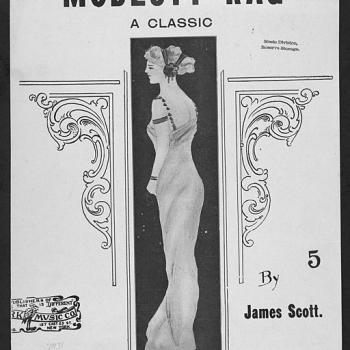 Catholic Does Not Equal the Vatican:
Catholic Does Not Equal the Vatican:
A Vision for Progressive Catholicism
by Rosemary Radford Ruether
The New Press / $23.95 US (list)
[Amazon] [New Press]
As one of the pioneers of feminist theology, Rosemary Radford Ruether has had impressive, if controversial, career and if her new book is any indication, she is showing no sign of slowing or toning it down.
Her new book, part of the “Does Not Equal” series from The New Press, reads as a manifesto for “progressive Catholicism” against what Ruether, as others do, perceives as a wave of traditionalist back-pedaling. The series clearly intends to challenge and complexify religious traditions that appear from the outside to be monolithically “right-wing.” Such a series is indeed welcome and necessary at this historical moment when “religion is back” so to speak (although in most parts of the world, religion never went anywhere). Two other titles in the series are Evangelical Does Not Equal Republican… or Democrat and Judaism Does Not Equal Israel (I’m particularly interested to read the latter, written by Marc Ellis, a well-known Jewish liberation theologian).
There is much to like about this book. At a time when “traditionalist Catholicism” is supposedly “returning with full force” — from Latin Masses and cassocks to plenary indulgences and scapulars — or so the story runs in the media, it is clearly the case that the waves of renewal are nowhere near dying out despite the hopes and dreams of the Catholic blogosphere. The New Press knows it has an audience. Ruether’s books — as well as books by other giants of “progressive” Catholicism — remain solidly in print. She continues to have an audience among readers of popular Catholic texts, and this is something to celebrate.
Specifically, about half of the chapters are quite strong. The book begins with a moving, personal account of Ruether’s career in a chapter called “On Being a Progressive Catholic.” In it, she narrates her experiences in the Church and in the academy and beyond, giving particular attention to the ways in which her views have been challenged and widened such that her scholarship has moved into new areas, as can be seen in her books The Wrath of Jonah: The Crisis of Religious Nationalism in the Israeli-Palestinian Conflict and the boldly-titled America, Amerikkka: Elect Nation And Imperial Violence.
Chapter five provides a good summary of her ecclesiological vision of “a discipleship of equals” which has implications for Church life as well as theological study. And it’s a vision that is not merely a lingering fantasy of the Catholic “left,” but continues to be embodied in the Church today in various ways. Chapter six is a very fine account of the irruption of liberation theologies, their development over time (symbolized in the two figures of Ignacio Ellacuria and Ivone Gebara), and their continuing importance for the Church. I recommend the chapter as a short but accurate introduction to Latin American theology. Finally, the book contains Ruether’s now classic “Can Men Be Ordained?” as an epilogue.
The problems arise, of course, in her treatment of reproductive issues. Ruether, following Catholic ethicist Christine Gudorf, rightly points out the contradictions involved in the Church’s “pro-life” positions on various issues in that it takes an absolutist natural law ethical approach on abortion while taking what Ruether and Gudorf consider a consequentialist approach on issues such as war. These are indeed real contradictions felt by anyone who surveys the various ecclesial statements on “life issues” with any sort of seriousness. The problem with Ruether’s critique is that she situates it within the unexamined assumption that because this contradiction is real, the Church is therefore wrong on abortion and needs to get its act together so to speak. It does not seem to occur to her that 1) this is indeed an assumption that at least needs to be argued lest she settle for preaching to the choir, or 2) that perhaps a Catholic that is deeply passionate about the full range of life issues could come to the opposite conclusion: the Church needs to straighten up its position on war. The chapters on sexual politics and the Church indeed end up being a case of preaching to the choir and do not provide a serious look at these issues in any way.
Ruether also has a very binary view of the Church in this book, pitting Benedict and John Paul II against Paul VI and John XXIII and not giving a very nuanced understanding of these figures. Benedict’s thinking, while obviously problematic from a feminist liberationist perspective, simply deserves better treatment than Ruether extends to it, even in a short “manifesto”-type book such as this. For such an analysis — though admittedly from a more sympathetic perspective, yet very thorough in its detailed engagement — I recommend Tracey Rowland’s Ratzinger’s Faith.
Finally, I must remark about the title of the book. The problem with Ruether’s contribution to the “Does Not Equal” series — and I can’t say how it compares to the other two titles on this score — is that she never really adequately talks about the relationship between “Catholicism” and “the Vatican” other than to insist that they are “not the same thing” and to call repeatedly for “alternative church communities.” As a Catholic who is all for “alternative” expressions of church “from below” as this has been the source of renewal and passionate discipleship in the Church since its beginnings, I indeed agree with Ruether that “Catholic Does Not Equal the Vatican.” But Ruether does a disservice to the Church, to her own vision of a “progressive Catholicism,” and finally to her readers by not taking the relationship between the two seriously in this book.











